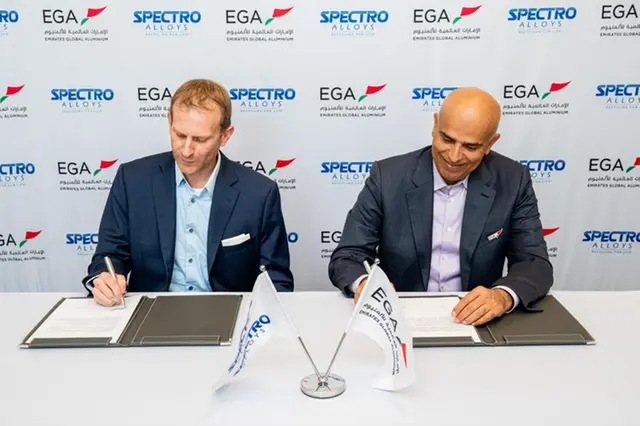Emirates Global Aluminium, the largest industrial company in the United Arab Emirates outside oil and gas and the biggest ‘premium aluminium’ producer in the world, today announced its intention to acquire a majority stake in American aluminium recycling firm Spectro Alloys Corporation.
The acquisition, which is subject to obtaining regulatory approvals, will accelerate EGA’s global expansion into aluminium recycling and expand EGA’s business in the United States.
Spectro Alloys is a leading secondary foundry alloy producer in the United States, founded in 1973, and based in Rosemount, Minnesota. The company has a production capacity of around 110 thousand tonnes per year of aluminium ingots, with a carbon intensity of less than one tonne of CO2 equivalent per tonne of aluminium produced.
Earlier this year, Spectro Alloys broke ground on an expansion project at its Rosemount site that will add approximately 55 thousand tonnes per year of secondary billet production capacity in the first phase, which is expected to be completed in 2025.
EGA intends to acquire 80 per cent of Spectro Alloys. The current owner-managers will retain a 20 per cent shareholding. EGA and Spectro Alloys have signed an equity purchase agreement and the transaction is expected to close during the third quarter of 2024.
In May, EGA acquired European specialty foundry Leichtmetall, and late last year EGA began construction of the UAE’s largest aluminium recycling plant.
Abdulnasser Bin Kalban, Chief Executive Officer of Emirates Global Aluminium, said: “EGA is the biggest ‘premium aluminium’ producer in the world and our goal is to grow further in both primary and recycled aluminium to meet the growing global demand for a metal which is essential for our world’s sustainable future. In the United States, which is already one of EGA’s largest global markets, this acquisition will significantly grow our business and expand our offering to customers with domestic production. Spectro Alloys has a strong and highly experienced team which is already implementing ambitious expansion plans, and will be a strong platform for the further development of an EGA recycling business in the United States. I look forward to working with Spectro Alloys’ team.”
Luke Palen, President of Spectro Alloys, said: “We have grown Spectro Alloys over the last five decades into one of the United States’ top aluminium recycling companies. By becoming part of EGA, the largest ‘premium aluminium’ producer in the world, we will unlock the next stage of our development in the fast-growing aluminum recycling industry. In the near term, this will allow us to accelerate our ongoing expansion project. In the long term, this is a big win for the future of aluminum recycling in the United States.”
The United States currently consumes some 4.9 million tonnes of recycled aluminium annually, accounting for half of all aluminium demand in the country and making the United States the second largest recycled aluminium market in the world. Demand for recycled aluminium in the United States is expected to reach some 7.6 million tonnes per year by 2033, according to CRU, an independent business intelligence organisation.
EGA sold approximately 550 thousand tonnes of primary aluminium in the United States in 2023.
Spectro Alloys currently supplies more than 125 customers, primarily in the Upper Midwest and Texas. Almost half of Spectro Alloys’ production is used in the automotive sector. Spectro Alloys sells to semi-fabricators, who in turn supply blue-chip end-user companies. Other important sectors for Spectro Alloys include small engine manufacturing, construction, and recreational vehicles.
Spectro Alloys sources aluminium scrap from more than 250 scrap suppliers in the region, and uses advanced sorting and analysis technology to produce the wide variety of alloys required by the company’s customers.
Market analysts expect global demand for recycled aluminium to double by 2040. Recycled aluminium is expected to account for around 60 per cent of the growth in global aluminium supply between now and 2030, and around 70 per cent of supply growth between 2030 and 2040.

